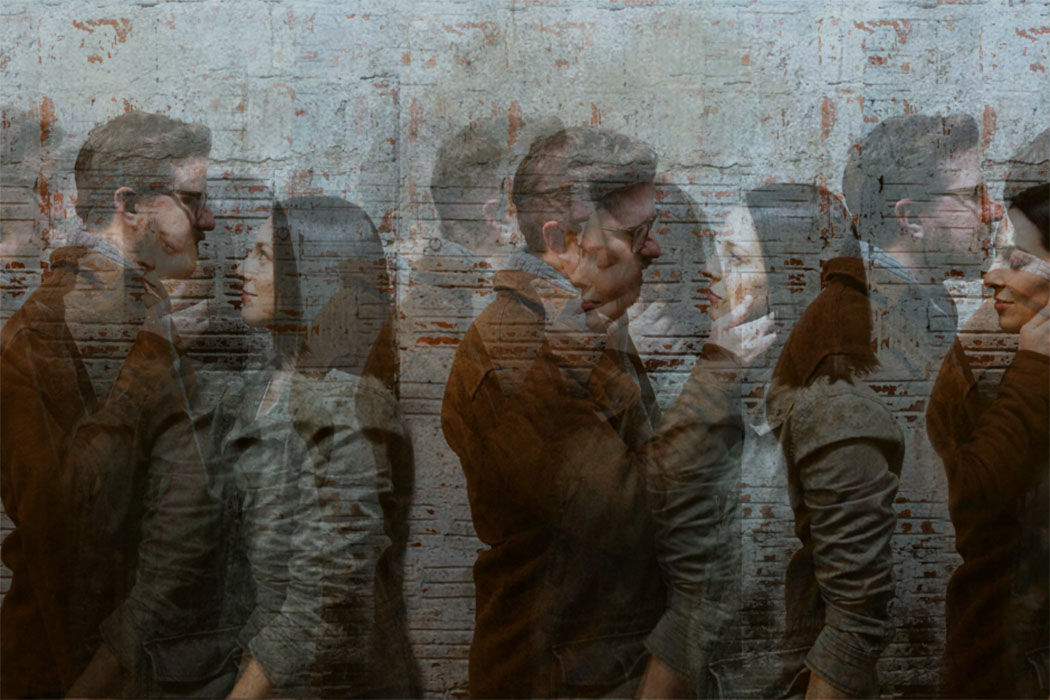Is life a matter of destiny or is it an infinite and seemingly random process of making choices? Not only does playwright Nick Payne make a firm case for the latter in his 70-minute, two character play, Constellations, he explores life’s inevitable “what if” questions from the standpoint of what quantum mechanics has to say about the nature of time and possibilities. Thankfully, no physics prerequisites are needed for viewing the River and Rail Theatre Company production of Constellations at the recently opened Old City Performing Arts Center—but a basic grasp of Payne’s dramatic puzzle makes for an intriguing underpinning.
Payne’s concept is that every choice we make—or don’t make—whether insignificant or important, creates a new “universe” and that all possible universes exist simultaneously, a fact that implies that time is really non-linear. Yikes.
Constellations’ two characters are the geeky Roland, a beekeeper, and Marianne, a equally geeky Cambridge University cosmologist specializing in early universe theory. We follow them through short scenes that each reflect a possible outcome of meeting, a romantic relationship, breaking up, and/or remaining a couple—or not. In Payne’s world, every possible outcome is equal, whether with irrelevant differences or major ones. Dialog between the two is replayed, often with only inflection differences or word changes, sometimes with meaningless results, other times with significant repercussions. Situations change—they meet and hit it off, or they meet and one is married. Their first date is a hit, or a total fiasco. They meet later, but without their previous history revealed. With each iteration, though, Payne allows us to learn a little more about the characters, or at least, he reveals possible different facets to their character.
Of course, such a dramatic structure could be unbearably tedious without a carefully designed structure and gravity of certain outcomes that adds to our collective understanding of what is occurring. Even more important, though, is the emerging view of the characters of Roland (Joshua Peterson) and Marianne (Martha Harms) that features not only powerful perception from the actors, but also the ability to fluidly, and believably, change from dominant to passive, from decisive to vulnerable, from tender to annoyed, in rapid succession.

Peterson’s portrayal of Roland is generally that of a pleasant and optimistic bloke, if somewhat clumsy socially and physically. Harms’ Marianne, though, is uniformly more confident and dominating, more living in the moment—traits that seem to work against her supposed professional geekiness.
Peterson, Harms, and director Chris McCreary have chosen to play those personality contrasts richly, but subtly, giving the audience the intellectual responsibility of determining values and drawing their own character conclusions in the scene variations. As a result, one is never certain which way a certain scene was headed and in what emotional context, even after the scene concludes.
McCreary and his designers, Erin Reed and Alice Trent, have chosen to do Constellations on a bare, relatively small, raised platform in a full-surround arrangement in Old City PAC. Despite this apparent intimacy, I couldn’t help feeling, though, that the gulf of concrete floor between stage and audience actually subtracted from the energy in the room, possibly lessening the overall emotional response of the characters and their permutations, and of the audience.
Ultimately, Constellations at River and Rail Theatre Company is a marvelous puzzle of a play that both challenges and delights. Yet, if Payne is to be believed, time is our apparent enemy, one that determines human interaction on our conflicted two-dimensional levels. It seems that we will be forever asking the question “what if”, but never waiting for, or even understanding, the answer.





